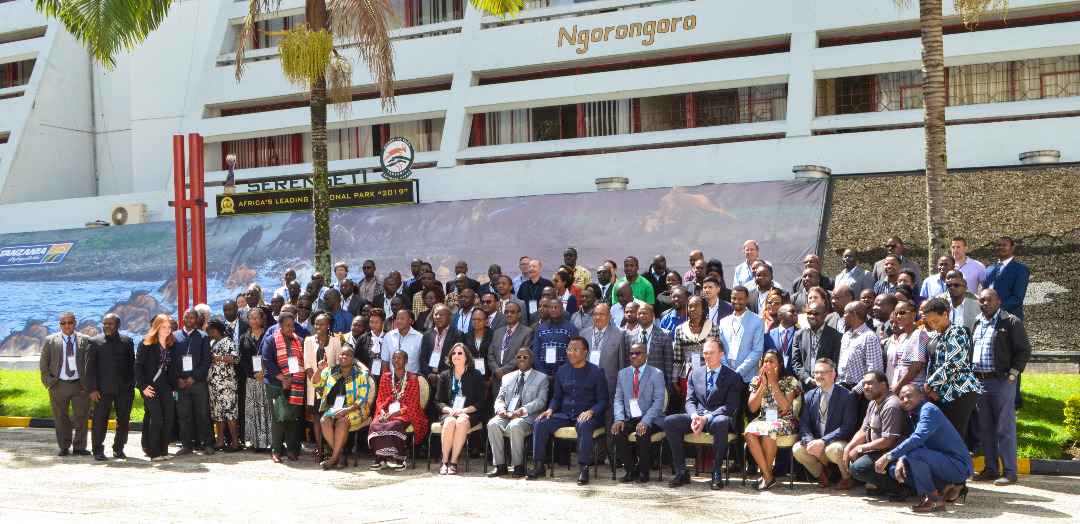AWF Integrates Policy and Climate-Smart Agriculture at the African Landscape Dialogue

General Inquiries
Tel:+254 711 063 000
Ngong Road, Karen, P.O. Box 310
00502 Nairobi, Kenya
Landscape leaders from across Africa gathered at the Arusha International Convention Centre this week to discuss and explore better practices towards restoring over 96 million hectares of degraded land on the continent by 2030.The first conference of its kind took place two years ago in Addis, where the leaders drafted and approved the African Landscapes Action Plan with a prime focus on multi-stakeholder partnerships, which has informed AWF's projects in Kilombero Valley over the years. The event was sponsored by various stakeholders: The Government of Netherlands, SwedBio, The David and Lucile Packard Foundation, The German Corporation, The National Land Use Planning Commission, Sanrem Africa, Ecoagriculture partners, Landscape for People Food and Nature, The Nature Conservancy, African Wildlife Foundation, NEPAD, AU, Water and Land Resource Center, Horn of Africa, Solidaridad, African Model Forests Network and USAID African Biodiversity Collaborative Group (ABCG).
Through IUCN's Sustainability and Inclusion Strategy for Growth Corridors in Africa (or SUSTAIN) program, and with support from the Netherlands Ministry of Foreign Affairs, the Global Nature Fund, the German Federal Ministry for the Environment, Nature Conservation, Building and Nuclear Safety, and the International Climate Initiative, AWF takes a partnership approach to delivering conservation outcomes in the Kilombero Valley.
These partnerships recognize and support farmers' contributions to sustainable land management. The success stories were shared in the conference with notable improvements in the mechanisms highlighted and emphasized as a proper model to emulate. AWF has centered its approach to focus on the youth within the region to ensure that the program is sustainable and practical for the community.
"The local champions should continue carrying the integrated landscape management agenda at local and national levels. To achieve sustainable landscape management, the youth must sit in the front seats in addressing our development challenges and improve the life system. It is impossible to expect this young generation to champion sustainable practices when they are not included in the discussions," says Pastor Magingi, AWF Program Manager, who also led a session at the event.
Every African nation has signed on to the Sustainable Development Goals, and the conference sought to address the implications of the goals vis-à-vis the rising population pressure, fragile resources, and increased food demand in Africa. With these issues at hand, it is important to develop a customized approach that will help achieve the SDGs by including policymakers in the conversation.
"We need to learn from each other, and we have agreed that we should not limit ourselves to East African scholars and landscape experts, but we should venture out to other parts of Africa like Francophone or Lusophone Africa so as to grow together as a continent." Stephen Nindi, Director-General of the National Land Use Plan Commission, emphasized.
During the dialogue, learning from each other's landscapes was conducted through presentations. AWF informed the African Landscape Leaders on the effectiveness of the Multi-Stakeholder Platform and how it influences landscape planning. The initiated Integrated Kilombero Multi-Stakeholder Platform accelerated the nomination of Kilombero Landscape as a Special Planning Zone under Tanzania's Land Use Planning Act no.6 of 2007. This influence responds to African Landscapes Action Plan set in Addis and could be drawn as a success story to other Tanzanian and African Landscapes.
The dialogue participants were also taught on the best models to manage connectivity zones like the Manyara Ranch management model, where AWF acts as a caretaker. This is a multi-use model whereby Maasai community members access to pasture for their livestock while ensuring ecological systems are sustainably functioning.
One of the action points agreed upon from the conference is that focus has to be put on sustainable and inclusive development at the local level, which will require a massive investment in the capacity of African landscape leaders. Other themes discussed in the forum include landscape convening and governance, climate-smart landscapes planning and policy, business engagement, employment, and entrepreneurship for a green economy, wildlife and biodiversity in landscape management, landscape finance and investment, and property rights, and land-use planning.